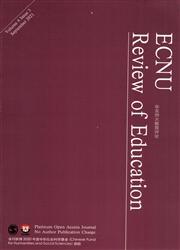Law Education in Japan and China: Comparative Analysis Focusing on Law-Related Materials
IF 2.6
Q1 EDUCATION & EDUCATIONAL RESEARCH
引用次数: 0
Abstract
Purpose This study examines law-related education in Japan and China to reveal the current state of research and identify the roles, possibilities, and challenges facing such teaching at the elementary, junior high, and senior high school levels. This study conducts a comparative review of research on perspectives toward law education in both countries, as well as the characteristics of and issues facing law education in Japan. Design/Approach/Methods This study examines trends in research and educational reform related to law education in Japan. In doing so, it evaluates how the characteristics of and issues facing law education in Japan are related to law education in China. Findings Results show no evidence of a systematic study of law in Japan. Reforming subjects to engage in collaborative learning is a more realistic strategy than attempting to design wholly new subjects. Accordingly, exploring what kind of learning activities are linked to law-abiding education in China offers insights and references for Japan. Adapting these strategies to the Japanese context and law material can help create a more systematic form of learning. Originality/Value Through joint research by researchers and educators from East Asian countries, we intend to conduct further research on the development of curricula, textbooks, and class models suited to specific subjects. Employing the joint research learning approach discussed in this study in Japan and China may result in further learning possibilities.日本和中国的法律教育:以法律相关材料为中心的比较分析
目的本研究考察了日本和中国的法律相关教育,以揭示研究现状,并确定小学、初中和高中法律相关教育的作用、可能性和面临的挑战。本研究对两国法律教育的研究视角以及日本法律教育的特点和面临的问题进行了比较回顾。设计/方法本研究考察了日本法律教育研究和教育改革的趋势。在此基础上,评价了日本法学教育的特点和面临的问题与中国法学教育的关系。调查结果显示,没有证据表明在日本进行了系统的法律研究。与尝试设计全新的科目相比,改革科目以参与协作学习是一种更现实的策略。因此,探讨什么样的学习活动与中国的守法教育相联系,对日本有一定的启示和借鉴意义。将这些策略与日语背景和法律材料相适应,有助于创造一种更系统的学习形式。创意/价值通过东亚国家研究人员和教育工作者的联合研究,我们打算对适合特定科目的课程、教科书和课堂模式的开发进行进一步研究。在日本和中国采用本研究中讨论的联合研究性学习方法可能会带来进一步的学习可能性。
本文章由计算机程序翻译,如有差异,请以英文原文为准。
求助全文
约1分钟内获得全文
求助全文
来源期刊

ECNU Review of Education
Social Sciences-Education
CiteScore
4.90
自引率
0.00%
发文量
41
审稿时长
10 weeks
 求助内容:
求助内容: 应助结果提醒方式:
应助结果提醒方式:


